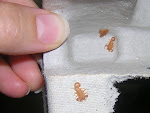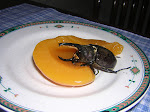 Uroctonus mordax, a light morph. Humboldt County, CA. June 2009.
Uroctonus mordax, a light morph. Humboldt County, CA. June 2009. Thanks to Dr. P hillip Brownell, Oregon State University Zoology Dept., for photo ID.
This scorpion was under a large, loose piece of Redwood bark about 30 mi. south of Eureka, CA. I found her at the end of a long hike in which I had flipped bark piece after piece, rolled rocks, dug under litter, etc., in search of any of the dozen or so native (and elusive!) PacNW scorpions. The prize log lay on the edge of an old haul road, about 12' feet away, and I eyed it there for some while deciding whether my blistered feet and disappointed spirit could stomach one more fruitless flip. A pointless contemplation! I can never pass up a flip! She was under a large piece of bark laying loosely on top of the Redwood, no prying required. I lifted it and bingo! This most beautiful critter:
Gorgeous!!
My whoops and hollers could be heard throughout the woods, a few excited expletives laced in. My friends came running, but when they saw the source of my excitement their reaction was considerably less...enthusiastic. Who cares?! My whoops continued. It was a great moment!
According to Dr. Phillip Brownell, who studies neurobiology at Oregon State University using arachnids, this individual scorpion is a "light morph"; U. mordax is typically darker. Her lighter appearance may due in part to her stretched abdomen. Notice how the pleural membrane -- the lighter, stretchy section between abdomenal segments -- is really noticeable, especially from the sides? She either has a very full belly, or (I think) she is gravid ("pregnant").
Most of you reading this have two questions at this point: 1) where do these occur? and 2) is it poisonous? U. mordax occurs in a variety of habitats throughout the PacNW, from under large rocks on gravelly slopes to the more moist and prey-rich habitat of under-bark on decaying logs, among others. "Under" is the key word. For the most part, you'll have to lift, flip, and dig for scorpions in this region, and just plain get lucky (as I did). They do have venom, as do most arachnids, but it isn't going to kill you or send you to an emergency room unless you have some kind of rare allergic reaction. The scorpion with the most potent venom in the U.S. includes species in the Centruroides genus, and you'll find them only in the Southwest. I'm not an expert on U. mordax or other scorpions of the PacNW. My knowledge of them is limited, I'm learning as I go. But I can say this: during several years of handling the more toxic Southwest genera of scorpions on a daily basis, I was NEVER stung. In other words: don't worry about U. mordax!
This and other PacNW scorpions are overlooked, shy creatures. Don't go running from your home or change your daily activities now that you know they exist in this region. If you've never encountered one, you likely never will. And if you ever do, take a moment to enjoy it because it may well be your last.
General info. on scorpions:
I've posted on scorpions here and here. If you want more information, perhaps check out:
The VenomList (U. mordax pictures, information, links)
National Geographic
Bug Guide
Blog post of a PacNW scorpion encounter
UC Davis (addresses desert SW scorpions, not those found in the PacNW)

+reduced.jpg)


9 comments:
Nice! I've caught a few of those, usually up in the cascades where I like to go camping, or in the Bend area.
I wish I had the love you do for these scorpions. Just moved to the redwoods (occidental) and have had 3 encounters in the past two weeks of them in my home, last one no joke was in my bed!! and their all alive I don't know what to do I'm ready to move again I think I have an infestation?
While hiking Multnomah Falls last evening my husband and I saw one crossing the trail. I had no idea we had them in the northwest.
Use to find them often as a youth in the hill above Spring Grove Avenue, in San Rafael, CA. At the time the area had not been developed and people use to deer hunt with bow and arrow in the woods. The scorpions were found in the stumps of first growth red wood trees harvested many years before my time. Also found many 4-5 inch centipedes at the same sites, as well as various long thin salamanders. Would go back to those days.
My Mosier neighbor found one of these in her "stuff" as she was moving out the other day 8/29. Feisty little thing. A dry creek bed runs alongside the house.
I was on your blog to find out more about this species. We just moved into a home on the central CA cost and we have found two inside. This concerns me as we have curious cats. I would rather appreciate these outside!
Anonymous (May 19): I'd recommend you get yourself a good black light and check the bed each night, bang your shoes out, etc. And consider placing some traps around the baseboards -- wherever you're catching the most suggests a common entrance area. Remember, too: pluck them up with tongs/LONG tweazers, place in bucket, and freeze for 2 days (I prefer to release at another location). Manual removal works well in trimming localized scorpion populations. Sorry to hear about your frustrations. Too much of any arthropod, however neat, can be upsetting.
"Take a moment to enjoy it because it may well be your last."
hmmm.
I have encountered MANY u.mordax at my new place where I am sleeping out (no tent)--on average 2 a day so far. At night these guys are on the move! It is a dry rocky slope--so, I am not surprised to find so many. What the author says about them being non-aggressive/shy makes sense because half of the ones I've found were dead, half-eaten or overcome by other insects--namely on the open (unprotected) roadway. Nevertheless I am uncomfortable camping in among them. I am familiar with spiders--so I know what to expect--these guys I just don't know what to think. Even a shy, non-aggressive scorpion could decide my unaware foot or sleeping, stirring body is an attacking predator--right?
Post a Comment